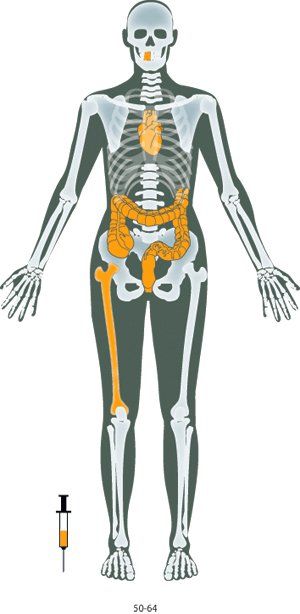
COLON-CANCER SCREENING
The USPSTF recommends that all adults be screened for colorectal cancer starting at 50 using colonoscopy, sigmoidoscopy, or fecal occult blood testing. Talk to your doctor about which type of test is best for you, and how frequently you need to have it.
MAMMOGRAMS
The USPSTF recommends that women get a mammogram every other year starting at 50.
HEART HEALTH
The USPSTF recommends that you get your blood pressure checked regularly. If you're a woman 55 or older, talk to your doctor about taking aspirin to prevent strokes.
PAP SMEARS
Women should continue getting Pap smears at least every three years, unless you've had a total hysterectomy for a reason other than cancer, says the USPSTF.
VACCINES
The ACIP recommends that all adults get a seasonal flu shot each year. Adults 60 or older should also get the shingles vaccine. Make sure to get a booster shot for tetanus and diphtheria every 10 years, and ask your doctor if you need any additional vaccines.
PROSTATE HEALTH
Some docs say that screening for elevated prostate-specific antigen levels and/or using rectal examination are worthwhile, yet the USPSTF says evidence is inconclusive for screening men younger than 75 years old.
DEPRESSION
The USPSTF recommends that adults get screened for depression if proper treatment is available.
ORAL HEALTH
At this stage in life, risk for gum disease has increased. As a result, flossing is especially important. Keep brushing twice a day and go to the dentist regularly (at least every six months).

SECOND OPINION | OSTEOPOROSIS DRUGS
Women lose bone at an accelerated pace during menopause as their estrogen levels plunge, which increases their risk of osteoporosis and devastating hip and spine fractures as they age. Related complications end up killing more women every year than breast cancer.
That doesn't mean that otherwise healthy 50- and 60-year-olds are good candidates for medications to prevent or treat osteoporosis. Be particularly skeptical if someone pushes treatment for osteopenia, a fancy word for moderately low bone density that, some experts argue, is often more about marketing than medicine. "The vast majority of [younger postmenopausal] women will not go on to develop osteoporosis," says Dr. Clifford Rosen of the Maine Medical Center Research Institute.
Although drugs called bisphosphonates can slow down the body's resorption of older, brittle bone and reduce the risk of fractures in high-risk people by 30 to 40 percent, little is known about their use beyond 10 years. Many experts worry that, over decades, bones could weaken as the proportion of older bone increases. Rare but scary reports of atypical femur and jaw fractures associated with the use of these drugs have also made more doctors wary of starting them too early. The USPSTF recommends checking bone density between ages 60 and 64 if you're at increased risk of the disease. Work with your doctor to figure out the best first defense against bone loss. For many, it will be a combination of calcium and vitamin-D supplements, plus an effective weight-bearing exercise program.
Research by Ian Yarett
Healthy Living: The Complete Package
Uncommon Knowledge
Newsweek is committed to challenging conventional wisdom and finding connections in the search for common ground.
Newsweek is committed to challenging conventional wisdom and finding connections in the search for common ground.





